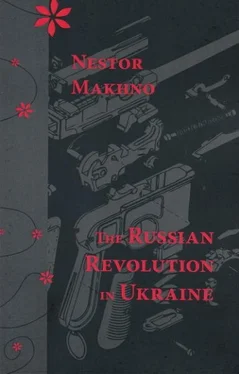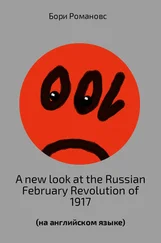Nestor Makhno - The Russian Revolution in Ukraine
Здесь есть возможность читать онлайн «Nestor Makhno - The Russian Revolution in Ukraine» весь текст электронной книги совершенно бесплатно (целиком полную версию без сокращений). В некоторых случаях можно слушать аудио, скачать через торрент в формате fb2 и присутствует краткое содержание. Город: Edmonton, Год выпуска: 2007, Издательство: Black Cat Press, Жанр: Биографии и Мемуары, на английском языке. Описание произведения, (предисловие) а так же отзывы посетителей доступны на портале библиотеки ЛибКат.
- Название:The Russian Revolution in Ukraine
- Автор:
- Издательство:Black Cat Press
- Жанр:
- Год:2007
- Город:Edmonton
- ISBN:нет данных
- Рейтинг книги:5 / 5. Голосов: 1
-
Избранное:Добавить в избранное
- Отзывы:
-
Ваша оценка:
- 100
- 1
- 2
- 3
- 4
- 5
The Russian Revolution in Ukraine: краткое содержание, описание и аннотация
Предлагаем к чтению аннотацию, описание, краткое содержание или предисловие (зависит от того, что написал сам автор книги «The Russian Revolution in Ukraine»). Если вы не нашли необходимую информацию о книге — напишите в комментариях, мы постараемся отыскать её.
The Russian Revolution in Ukraine
The Russian Revolution in Ukraine — читать онлайн бесплатно полную книгу (весь текст) целиком
Ниже представлен текст книги, разбитый по страницам. Система сохранения места последней прочитанной страницы, позволяет с удобством читать онлайн бесплатно книгу «The Russian Revolution in Ukraine», без необходимости каждый раз заново искать на чём Вы остановились. Поставьте закладку, и сможете в любой момент перейти на страницу, на которой закончили чтение.
Интервал:
Закладка:
This stance on the part of the peasants gave rise to the Declaration of the Gulyai-Pole Peasants’ Union stating that “the toiling peasants of the Gulyai-Pole raion believe in their inalienable right to proclaim as communal property the lands of the pomeschchiks, the monasteries, and the State, and intend to carry this into effect in the near future.” A special leaflet was issued urging the toiling peasantry to prepare themselves for this act of justice.
The voice of the Gulyai-Pole peasants was heard far beyond the borders of Ekaterinoslav gubernia. Delegates from peasant villages in other provinces began to arrive in Gulyai-Pole for consultations. This went on for several weeks. As Chairman of the Peasants’ Union, I was constantly busy with these delegations.
Comrades from other organizations had to fill in for me in my regular duties while I carried on discussions with the visiting delegates. To some I gave advice, to others direct instructions on how to organize the peasants into unions and prepare them for the seizure of the land. And having seized the land from the oppressors, the next step would be either to set up agricultural communes on the former estates, or divide up the land and distribute it to the needy.
Most of the delegations told me: “It would be a good thing if Gulyai-Pole were to act first.”
“Why?” I asked. The answer was always the same: “We don’t have any organizers. We read little and hardly any information reaches us. Agitators haven’t appeared among us… and we would not even have read the proclamations of your Union and the Anarchist Communist Group if our sons who work at the Yuzovsky Mine had not sent them to us.”
Listening to the voice of the downtrodden countryside, I felt pain but also anger. I cursed the comrades holed up in the cities, forgetting the oppressed countryside. And yet the triumph of the Revolution ultimately would depend on the countryside. Meanwhile the Provisional Government was already beginning to slow down the revolutionary process, to take control. The creative development of the toilers, gradually becoming conscious of themselves and their rights, was being replaced by written programs meaningless for the real life of the country.
And the more this mental anguish tormented me, the more I was moved to search out the most out-of-the-way corners of the countryside, together with my comrades, to tell the peasants the truth about their situation and about the state of the Revolution. I was willing to set aside all commitments in Gulyai-Pole for the moment, to carry this message to the peasants, for unless they threw their fresh energies into the struggle, the Revolution was doomed.
This work kept me away from Gulyai-Pole for several days. At this time I was cheered by the imminent return of P. A. Kropotkin to Russia, knowing he would draw the attention of the comrades to the oppressed countryside. And who knows? — maybe our old mentor, Uncle Vanya (Nikolai Rogdaev), who had been so active in Ukraine in tsarist times, would also return, along with other comrades less well-known but very active in the old days. Then our activity would get a real boost. The toiling masses would receive thoroughgoing replies to the questions which tormented them. The voice of anarchism would be heard everywhere in the oppressed countryside and would collect and group under its banner the toiling masses to do battle with the pomeshchiks and factory owners for a new world of freedom, equality, and solidarity among all the people.
I believed in this project to the point of fanaticism, and on its behalf I became more and more absorbed in the everyday life of the peasants and workers. I strongly urged the Gulyai-Pole Anarchist Group to do the same.
Chapter 8
The Workers’ Strike
Early in June the anarchists of Aleksandrovsk invited me to a conference being held to unify all the local anarchists into a federation. I came immediately to help the comrades come to an agreement. The Aleksandrovsk anarchists were all manual or intellectual workers. Formally they were divided into anarchocommunists and anarcho-individualists, but in reality they were all revolutionary anarcho-communists. All of them I esteemed as the closest of friends and I did my best to help them set up a federation. After organizing themselves, they began to organize the workers and for a time had a great ideological influence on them.
When I returned from Aleksandrovsk, the workers of the Gulyai-Pole Union of Metal and Carpentry Workers invited me to help them set up their union and sign up as a member myself. And when I did this they asked me to direct their impending strike.
Now I was completely absorbed, firstly by the affairs of the Peasant’s Union, secondly by the workers. However, among the workers there were comrades with a better grasp of workplace problems than myself, for which I was grateful. I undertook to lead the strike, hoping to win over these fine comrades and draw them into our Group. One of them — V. Antonov — was sympathetic to the S-Rs. The others were non-party. Of these especially energetic were Seregin and Mironov.
Before declaring the strike, the workers of both foundries, all the mills, home workshops, blacksmith’s and joiner’s shops held a meeting. The upshot was that I was asked to formulate their demands and present them through the union executive to the owners of the enterprises. While this was going on it became clear to me that comrades Antonov, Seregin, and Mironov had been working as anarchists for quite some time in the workshop committees. In fact Antonov had been elected chairman of the Soviet of Workers’ Deputies. These comrades had not joined our Group only because they were overloaded with their work in the shops. Naturally I was against this. From the day of my return from prison I had insisted on the necessity of our Group being well-informed about the work of all our supporters among the peasants. So I strongly urged these comrades to join the Group immediately and in future to coordinate with us their own work in the workshop committees and among the workers generally. The comrades entered the Group and then joined with me in summoning the proprietors of all the enterprises in order to present them with the workers’ demands, which reduced simply to: a wage increase of 80 to 100 percent.
Such a proposal from the workers aroused a storm of protest from the proprietors who categorically refused a wage hike of any such proportions. We gave them one day to consider our position while the workers continued to work at their machines. The next day the proprietors came to the Union Soviet with their own counter proposal of a 35 to 40 percent wage increase. As representatives of the workers we considered this offer insulting and, after a lengthy debate which became abusive on both sides, we offered them one more day to reconsider, as required by civil law. The proprietors and their agents, some of whom knew the constitutions of trade unions by heart and were socialists by conviction, left the meeting assuring us they would not be returning the next day with an offer higher than the one already on the table. They knew the central authorities would back them up.
We called together the members of the workshop committees and representatives from the home workshops and discussed a simultaneous work stoppage for the following day, timed to coincide with the moment when the proprietors would leave the trade union Soviet after arriving without a new offer. It was decided that the Soviet must plant one of its supporters at the telephone exchange to connect my telephone directly with all the workshops. Then I could advise the workers of the rejection of their demands and the owners, upon returning to their enterprises, would be greeted by demonstrations of striking workers.
Читать дальшеИнтервал:
Закладка:
Похожие книги на «The Russian Revolution in Ukraine»
Представляем Вашему вниманию похожие книги на «The Russian Revolution in Ukraine» списком для выбора. Мы отобрали схожую по названию и смыслу литературу в надежде предоставить читателям больше вариантов отыскать новые, интересные, ещё непрочитанные произведения.
Обсуждение, отзывы о книге «The Russian Revolution in Ukraine» и просто собственные мнения читателей. Оставьте ваши комментарии, напишите, что Вы думаете о произведении, его смысле или главных героях. Укажите что конкретно понравилось, а что нет, и почему Вы так считаете.












